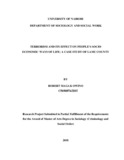| dc.description.abstract | The purpose of this study was to investigate terrorism and its effect on people’s socio economic ways of life in Lamu County. The region has experienced perennial terror attacks during the period under study where the civilian and the military have borne the brunt of the attacks. There have been several deaths and injuries occasioned by these attacks to both the non- combatants and combatants. The specific objectives of the study that guided the purpose of the research included the effect of terrorism on the people’s socioeconomic ways of life, effect of terror attack on provision of services, and the government and community’s response to terror attacks. The study adopted the framing theory, contagion theory, and relative deprivation theory. Methodologically, the study applied a descriptive survey research design and targeted all households and key informants, such as local administration and law enforcement officers. Purposive sampling was applied as a key sampling technique. The primary data were obtained from the 110 primary respondents who were men and women who were household heads in the affected villages using standardized questionnaire. The data from the key informants were obtained from a key informant interview guide generated through qualitative data. The study analyzed the nature, strength and extent of the associations between the variables under the conceptual framework. Data was analyzed using descriptive statistics, which include frequency counts and percentages. Some of the results were presented using charts and tables that have been generated from the SPSS and Excel spreadsheets. Analysis of the collected data revealed that terrorism attacks have not only caused fear, but has also disrupted regular social activities. There is collateral damage to the infrastructure and forced displacements of the inhabitants due to terror activities in the region. The terror acts have impeded the provisions of essential services such as education and health, where a number of schools have been closed to give way to the makeshift military camps and learners transferred to other schools or simply denied the right or opportunity to learn. The provision of medical services has suffered the same fate as the health facilities have either been abandoned or destroyed. The study concludes and recommends that the government need to cushion the affected individuals by institutionalizing community policing in the area so that there is close working relationship between the law enforcement officers and the community | en_US |



